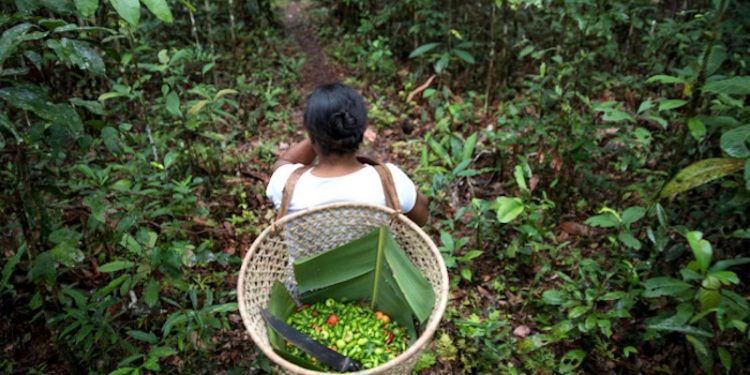Advanced cookie settings
To improve your experience on the platform and provide personalized services, we use cookies.
Notícias
FAMILY FARMING HARVEST PLAN

- Image: Flickr/MDA.
The Brazilian Ministry of Agrarian Development and Family Farming (MDA) established today (June 3) the Productive Forests National Program (Programa Nacional de Florestas Produtivas) in partnership with the Ministry of the Environment and Climate Change (Ministério do Meio Ambiente e Mudanças do Clima/MMA). This program aims to recover degraded areas and turn them into productive land, promoting environmental compliance for family farming and increasing the production of healthy food and sociobiodiversity products.
This program will target family farmers, including those in land reform and traditional community settlements. In addition to food production and job and income generation, the initiative will also contribute to meeting national and international climate change goals.
The program is based on a farming science methodology called ATER, which provides technical assistance and rural extension support to improve sustainable family farming and food production and, at a later stage, facilitate access to collective equipment to build productive chains. Another key aspect is the Pronaf Floresta credit line, enabling productive restoration with quality and efficiency. The updates to this line include increasing the financing limit from BRL 80,000 to BRL 100,000 and reducing the interest rate from 4% to 3% per year.
In order to solidify the farmers’ agricultural-forestry knowledge, the program will create Casas da Floresta (Forest Houses), community nurseries and popular units for technological reference. The Casas da Floresta aim to structure pre-existing spaces, such as rural schools and community centers to enable knowledge building and sharing.
The community nurseries will receive seed banks and seedlings to be distributed to the families supported by the program. And the popular units of technological reference will teach cultivation techniques to the families.
“The program will spread productivity restoration knowledge for family farmers and traditional peoples and communities in all six Brazilian biomes,” explained the Brazilian Minister of Agrarian Development and Family Farming, Paulo Teixeira.
“Our goal is to foster sustainable production of healthy food; food and nutritional security for the population; work, job and income generation; global warming mitigation; and the fulfillment of national targets for Greenhouse Gas Emission (GEE) reduction established in the Paris Agreement. We want to deliver several areas that had been degraded, but now are fully recovered and with ongoing food production,” added the Minister.
Territory selection
The territories will be selected through a partnership with the National Institute of Colonization and Agrarian Reform (Instituto Nacional de Colonização e Reforma Agrária/INCRA) and the National Agency of Technical Assistance and Rural Extension (Agência Nacional de Assistência Técnica e Extensão Rural/ANATER). The ANATER will issue a public call to select the organizations that will implement the program section related to ATER with the contemplated families.
The state of Pará was selected to host the inaugural project, benefiting a total of 1,680 families in 21 contemplated settlements. According to MDA’s Secretary for Land Governance, Territorial and Social and Environmental Development, Moisés Savian, the Productive Forests program is a springboard for later achievements.
“We are using nature as an asset for families who will be the protagonists of sustainable development while improving their quality of life and overcoming challenges,” stated the secretary. He also underscored the project’s transversal approach to public policies and its capacity to enable the establishment of other actions at various levels of government. “Initiatives such as credits from the Family Farming Harvest Plan, the Policy for Minimum Price Guarantee for Sociobiodiversity Products (PGPMBio) and others from the municipal and state levels, can come into play through this program.”
Northern Region
Brazil’s Northern Region was not chosen by accident: 81% of Brazilian rural settlements are located in the Legal Amazon, according to a study titled Amazônia 2030. In total, the settlements occupy the equivalent to 36.6 million hectares—an area that is larger than Germany. Additionally, 4 out of every 10 inhabitants from rural areas of the Legal Amazon live in settlements.
Data from the 2nd National Survey on Food Insecurity in the Context of the COVID-19 Pandemic in Brazil show that over ¼ of Northern families experience food and nutritional insecurity. Hence, the Productive Forests program was born from the need to increase food production while generating employment and income for rural families and increasing the protection of fields, waters and forests.
The Brazil of the future
Although the Amazon Rainforest is the world’s largest forest, Brazil is among the seven countries with the most Greenhouse Gas Effect (GEE) emission levels globally, according to Climate Watch (2021). A study by the organization pointed out that 34.83% of the causes of these emissions are related to agriculture and 25.8% come from changes in land use and silviculture (fires and deforestation, for example). Furthermore, 70% of the total deforested area in settlements inside the Legal Amazon correspond to pastures.
In this sense, the Productive Forests Program represents a response to a variety of issues because it increases food supplies, creates job and income opportunities and generates the conditions for agriculture to become part of the solution in the context of climate change.
Brazil is committed to achieving the Paris Agreement goals, particularly in its role as G20 President, where it leads the Agriculture and Bioeconomy Working Groups and as the host of COP 30 next year in Belém (Pará).
Family Agriculture Harvest Plan 2024-2025
The Family Agriculture Harvest Plan 2024/2025 is a pool of measures by the Federal Government aimed at strengthening family agriculture to promote the sustainable production of healthy foods for Brazil. The plan will offer differentiated credit lines, technical assistance and rural extension support, insurance and training. It will also foster research and technological innovation and contribute to the agri-ecological transition.
